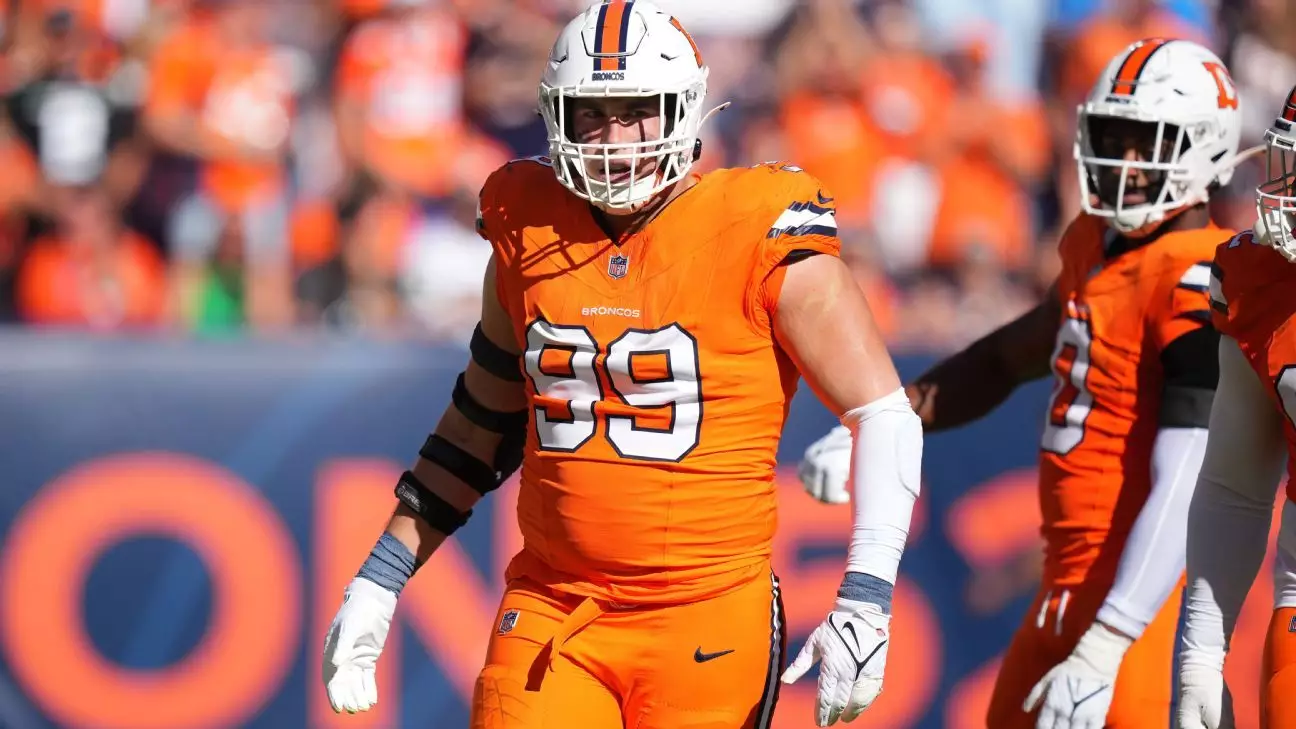The Denver Broncos are demonstrating a deliberate approach to crafting their future, with recent contract extensions signaling an aggressive yet thoughtful effort to retain top talent. The signing of Zach Allen to a four-year, $102 million extension, including $69.5 million guaranteed, highlights an organizational commitment to strengthening their defensive unit. While the average fan might view such deals as mere financial transactions, the reality is that they serve as much more: they are declarations of trust, stability, and a shared vision for sustained success. These deals aren’t just about rewarding past performance—they are investments in a strategic blueprint designed to forge a cohesive and resilient team.
What stands out most about these negotiations is the collaborative spirit displayed. According to sources, the process was smooth and devoid of contentious disputes—a significant achievement in professional sports. The Broncos prioritized respect and transparency, which not only fostered goodwill but also set a precedent for future negotiations. This culture of open dialogue reveals a franchise that values its players beyond their on-field contributions, understanding that mutual respect is essential in cultivating genuine team chemistry.
In the broader context of the NFL, where contracts can often become battlegrounds filled with acrimony, Denver’s approach illustrates a more sustainable model. By extending Allen before the final year of his previous deal, the Broncos effectively locked in a critical piece of their defense—a move that balances fiscal responsibility with an understanding of the player’s instrumental role. This forward-thinking strategy contrasts sharply with reactive or short-term fixes, emphasizing vision rather than just immediate gains.
Versatility and Endurance: The Hallmarks of Zach Allen’s Value
Zach Allen’s signing underscores an appreciation not only for production but also for intangibles like durability and adaptability. His impressive snap count—89% last season—illustrates a level of stamina that is increasingly rare in today’s NFL. The ability to sustain high performance over a grueling season, especially in the fierce trenches where physical tolls are immense, makes Allen a cornerstone on Denver’s defensive line.
Coach Sean Payton’s praise for Allen’s stamina and versatility sheds light on an often-overlooked aspect of player valuation: endurance. In a league where the demands of a game can quickly sap an athlete’s energy, Allen’s capacity to maintain peak condition and perform at key moments makes him an indispensable asset. His fluency across different positions, playing both end and tackle as needed, offers the coaching staff tactical flexibility and depth. This multifaceted skill set is increasingly vital in the modern NFL, which has shifted toward hybrid roles and flexible defensive schemes.
Further, Allen’s rise is not incidental. His career-high numbers—such as 8.5 sacks and 40 quarterback knockdowns—signal a player who continually pushes his limits. For a team seeking long-term stability, investing in a player with both elite production and durability is a strategic masterstroke. It indicates an understanding that modern football isn’t merely about star power but also about reliable workhorses who can adapt to game plans and stay healthy under the relentless physicality of the sport.
Behind the Deal: Building Loyalty and Navigating Future Challenges
The negotiations involving Allen reveal a calculated approach to cultivating player loyalty. The absence of discord during the extension talks demonstrates an organization that values partnership. Such harmony not only preserves morale but also builds a culture of loyalty—an intangible currency that can translate into improved performance on Sundays.
However, the path forward remains fraught with challenges. The discussion around Nik Bonitto, scheduled to be an unrestricted free agent, underscores the delicate balancing act of team management. Bonitto, who led the team with 13.5 sacks last season and earned second-team All-Pro honors, represents a crucial piece in Denver’s defensive puzzle. His situation illustrates how the Broncos must prioritize their internal talent pipeline to sustain success, especially considering external market factors and salary cap constraints.
This focus on internal development and contract management is more than strategic; it’s philosophical. The Broncos’ current approach suggests that they view their roster as a cohesive unit built on continuity and mutual investment. It’s a proactive stance that rewards players for their performance while preparing the team for future flexibility.
In essence, Denver’s recent contract activity is a blueprint for franchise stability. It’s a declaration that good football isn’t just about acquiring star players but about respecting and retaining the ones who embody the team’s long-term vision. Their investments reflect a shift from reactive roster building to a more nuanced, relationship-based strategy—one that could very well elevate the Broncos to new heights in the NFL landscape.


Leave a Reply